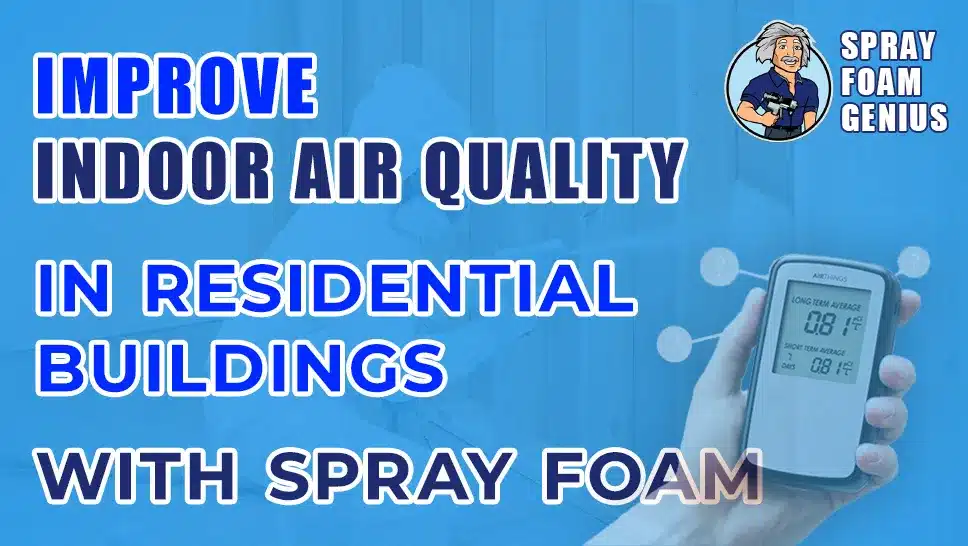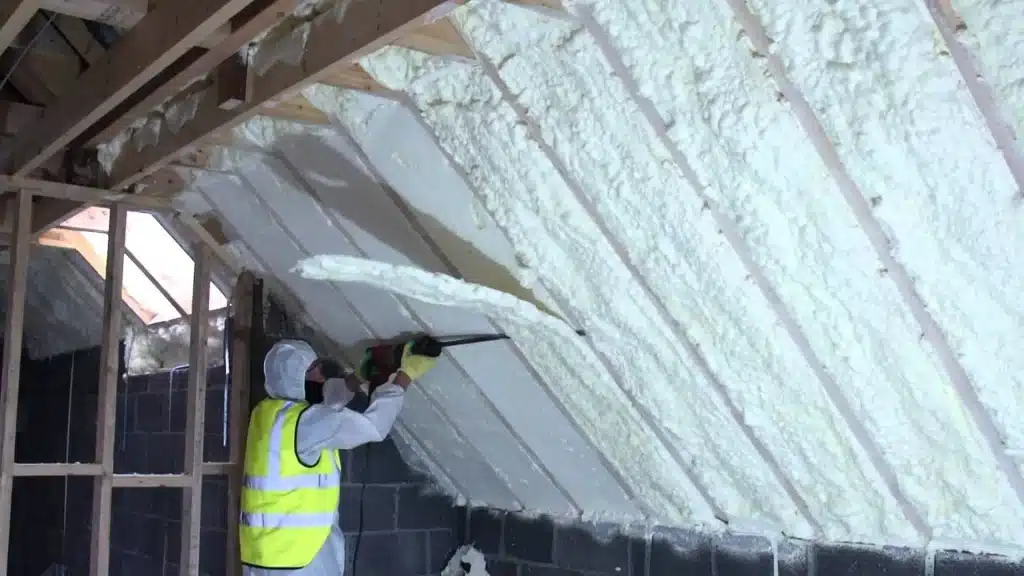
Spray foam insulation is more than just a modern solution for boosting energy efficiency; it’s also a powerful tool for improving indoor air quality (IAQ) in residential buildings. By sealing gaps and enhancing the barrier between indoor and outdoor environments, spray foam insulation contributes significantly to a healthier living space. This guide explores how spray foam insulation enhances indoor air quality, its environmental benefits, and practical considerations for homeowners in the USA and Canada.
What is Spray Foam Insulation?
Spray foam insulation is a type of insulation applied as a liquid that expands into a foam. This foam fills gaps, cracks, and voids in walls, roofs, and other areas, creating a continuous, airtight seal. It’s made from two main components: isocyanate and polyol resin. When these components are mixed, they react and expand, forming a rigid foam that adheres to surfaces and provides excellent insulation.
Types of Spray Foam Insulation
Open-Cell Spray Foam
- Characteristics: Open-cell spray foam is softer and more flexible compared to closed-cell foam. It has a lower density and is less resistant to moisture.
- Applications: This type of foam is often used for interior applications, such as soundproofing and insulation in non-moisture-prone areas. It’s effective at reducing sound transmission between rooms, making it ideal for residential interiors.
Closed-Cell Spray Foam
- Characteristics: Closed-cell spray foam is denser and provides a higher R-value per inch of thickness. It has a closed cellular structure that resists moisture and has better insulation properties.
- Applications: This type is ideal for exterior applications and areas exposed to moisture, such as basements, crawl spaces, and exterior walls. Its moisture resistance makes it suitable for areas where dampness and mold are concerns.
How Spray Foam Insulation Enhances Indoor Air Quality

1. Reduction of Air Leaks
Air leaks are a significant factor affecting indoor air quality. Gaps and cracks around windows, doors, and other areas allow outdoor pollutants, such as pollen, dust, and exhaust fumes, to enter your home. Spray foam insulation expands upon application to fill these gaps completely, creating an airtight seal that prevents unwanted air infiltration. This results in a more controlled indoor environment and cleaner air inside the home.
2. Prevention of Mold and Mildew
Moisture management is crucial for preventing mold and mildew growth, which can lead to various health issues, including respiratory problems and allergies. Closed-cell spray foam insulation acts as a moisture barrier, stopping water from seeping into wall cavities and other areas where mold can grow. By keeping these areas dry, spray foam insulation reduces the risk of mold and mildew formation, contributing to a healthier indoor environment.
3. Improved Ventilation
Effective ventilation is essential for maintaining good indoor air quality. Spray foam insulation can enhance ventilation by reducing the need for excessive air exchange through gaps and leaks. With fewer leaks, the home’s HVAC system can operate more efficiently, managing indoor air quality with better control. This allows for the use of advanced ventilation systems, such as air purifiers and dehumidifiers, which can further improve the quality of the air inside the home.
4. Enhanced Filtration
By creating a tight seal around gaps and cracks, spray foam insulation improves the home’s overall filtration system. It prevents dust, allergens, and other airborne particles from entering your living spaces. This reduces the burden on your HVAC system, which can then focus on filtering out contaminants more effectively. The result is cleaner, fresher air throughout your home.
5. Reduction of Radon Gas
Radon is a naturally occurring radioactive gas that can seep into homes through cracks in floors, walls, and foundations. It poses serious health risks, including lung cancer. Spray foam insulation provides a robust barrier that helps to reduce radon gas infiltration. By sealing gaps and cracks, it minimizes the pathways through which radon can enter your home, contributing to a safer indoor environment.
6. Reduction of VOCs
Volatile Organic Compounds (VOCs) are chemicals emitted by various building materials, cleaning products, and other household items. These compounds can adversely affect indoor air quality and contribute to health issues such as headaches, dizziness, and respiratory problems. Spray foam insulation, especially closed-cell foam, has low levels of VOC emissions, which helps to reduce the concentration of VOCs in your home, promoting better air quality.
Environmental Benefits of Spray Foam Insulation
1. Energy Efficiency
One of the most significant benefits of spray foam insulation is its ability to enhance energy efficiency. By creating an airtight seal and improving thermal resistance, spray foam insulation helps to reduce heating and cooling costs. This not only lowers your energy bills but also decreases the amount of energy needed to maintain comfortable indoor temperatures. Consequently, spray foam insulation contributes to a reduction in your home’s carbon footprint.
2. Sustainability
Spray foam insulation is made from eco-friendly materials and has a long lifespan, which reduces the need for frequent replacements. Its durability means that it maintains its insulating properties for decades, leading to less waste and a more sustainable building practice. Additionally, by reducing the amount of energy required for heating and cooling, spray foam insulation indirectly supports environmental sustainability.
3. Waste Reduction
Unlike traditional insulation materials, which can create significant waste during installation, spray foam insulation is applied on-site and expands to fill all available spaces. This minimizes material waste and ensures that every bit of insulation is used efficiently. By reducing the amount of waste generated during the installation process, spray foam insulation contributes to a more sustainable construction practice.
4. Longevity
Spray foam insulation is known for its durability and long lifespan. It does not sag or settle over time, maintaining its insulating properties for decades. This longevity reduces the need for frequent replacements and repairs, which contributes to a lower overall environmental impact and less frequent resource consumption.
Key Considerations for Homeowners
1. Professional Installation
To maximize the benefits of spray foam insulation and ensure proper indoor air quality, it’s essential to have it installed by a qualified professional. Proper installation ensures that the foam expands and adheres correctly, creating an effective barrier against air and moisture infiltration. Poor installation can lead to gaps and reduced effectiveness, undermining the benefits of spray foam insulation.
2. Health Considerations
While spray foam insulation offers numerous advantages, it’s important to consider potential health impacts related to off-gassing during and immediately after installation. Choosing a contractor who uses high-quality, low-VOC products can minimize these impacts. Additionally, ensuring proper ventilation during and after installation helps to maintain a healthy indoor environment and mitigate any potential health concerns.
3. Cost vs. Benefit
The initial cost of spray foam insulation can be higher compared to traditional insulation materials. However, the long-term benefits, including energy savings, improved indoor air quality, and reduced environmental impact, often outweigh the upfront investment. When evaluating insulation options, consider both the immediate costs and the long-term advantages to make an informed decision that aligns with your needs and budget.
Take the Next Step for a Healthier Home
If you’re ready to enhance your home’s indoor air quality and energy efficiency with spray foam insulation, contact Spray Foam Genius Marketing today! Our team of experts is here to provide guidance, answer your questions, and ensure a professional installation.
Call us at 877-840-FOAM for USA and 844-741-FOAM for Canada visit our website at sprayfoamgeniusmarketing.com, or email us at [email protected] to get started.
Improve your home’s air quality, save on energy costs, and support a healthier environment with spray foam insulation. Reach out to us now for a consultation and take the first step towards a better living space!
- Social Media Marketing for Spray Foam Businesses: What Works in 2025? - February 6, 2025
- Best SEO Strategies for Spray Foam Insulation Contractors to Rank #1 on Google - February 6, 2025
- What is Spray Foam Insulation? Benefits and Applications - February 5, 2025

